An Analysis of the Business Environment's Impact on Tesco's Strategies
VerifiedAdded on 2019/12/03
|7
|1626
|253
Report
AI Summary
This report provides an analysis of the business environment impacting Tesco, a major UK retailer. It begins by defining the business environment and its importance, then delves into the significance of different economic systems (free market, command, and mixed economies) and their effects on resource allocation. The report examines the impact of fiscal and monetary policies, such as tax rates, inflation, and interest rates, on Tesco's financial performance and expansion capabilities. It also explores the effects of competition policy, including regulations and market dynamics, on Tesco's marketing strategies and competitive positioning against rivals. The conclusion summarizes the key findings regarding the influence of these factors on Tesco's operations and strategic decisions, highlighting the complex interplay between government policies, market forces, and business outcomes. The report is supported by references to various sources, including economic websites and academic publications.
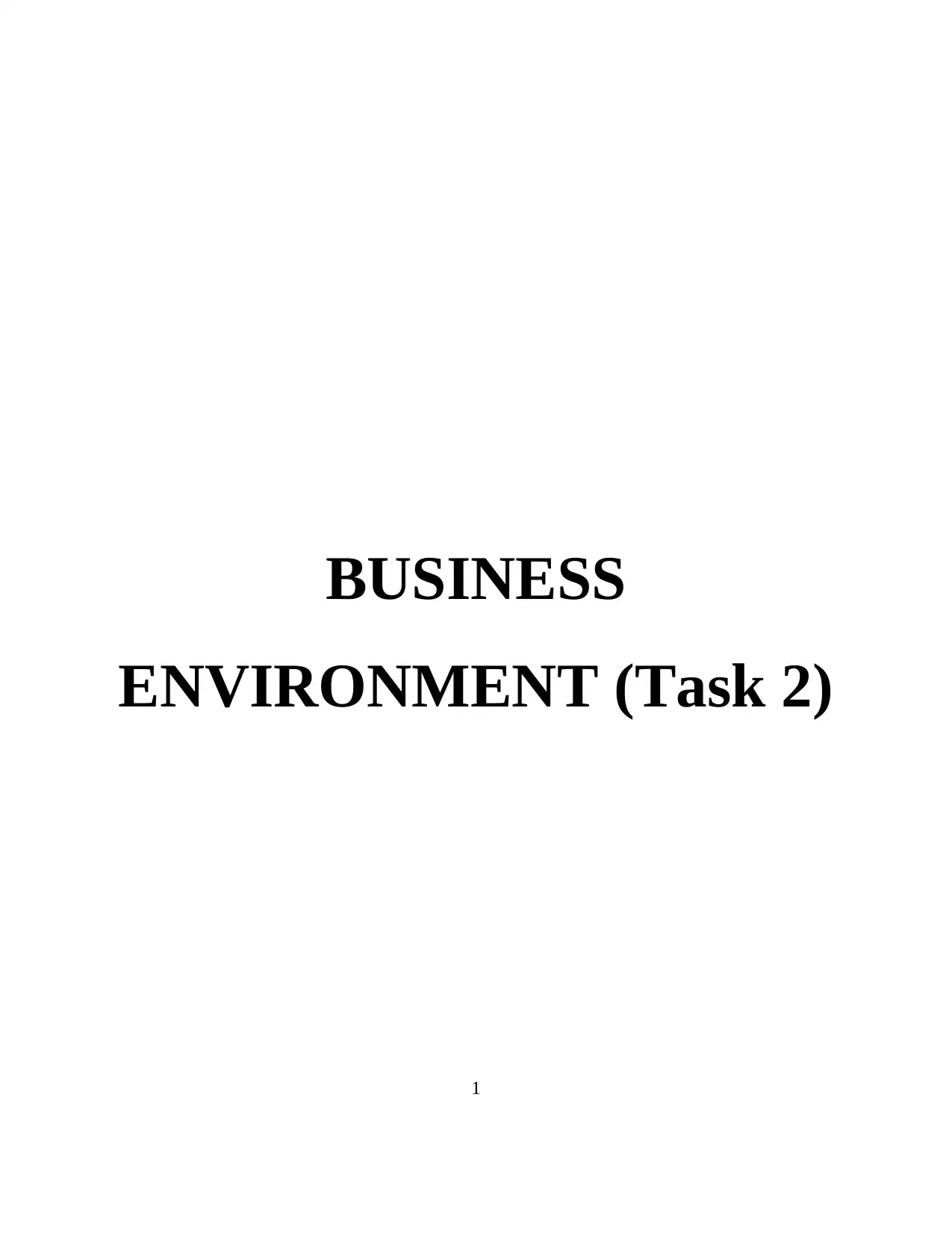
BUSINESS
ENVIRONMENT (Task 2)
1
ENVIRONMENT (Task 2)
1
Paraphrase This Document
Need a fresh take? Get an instant paraphrase of this document with our AI Paraphraser
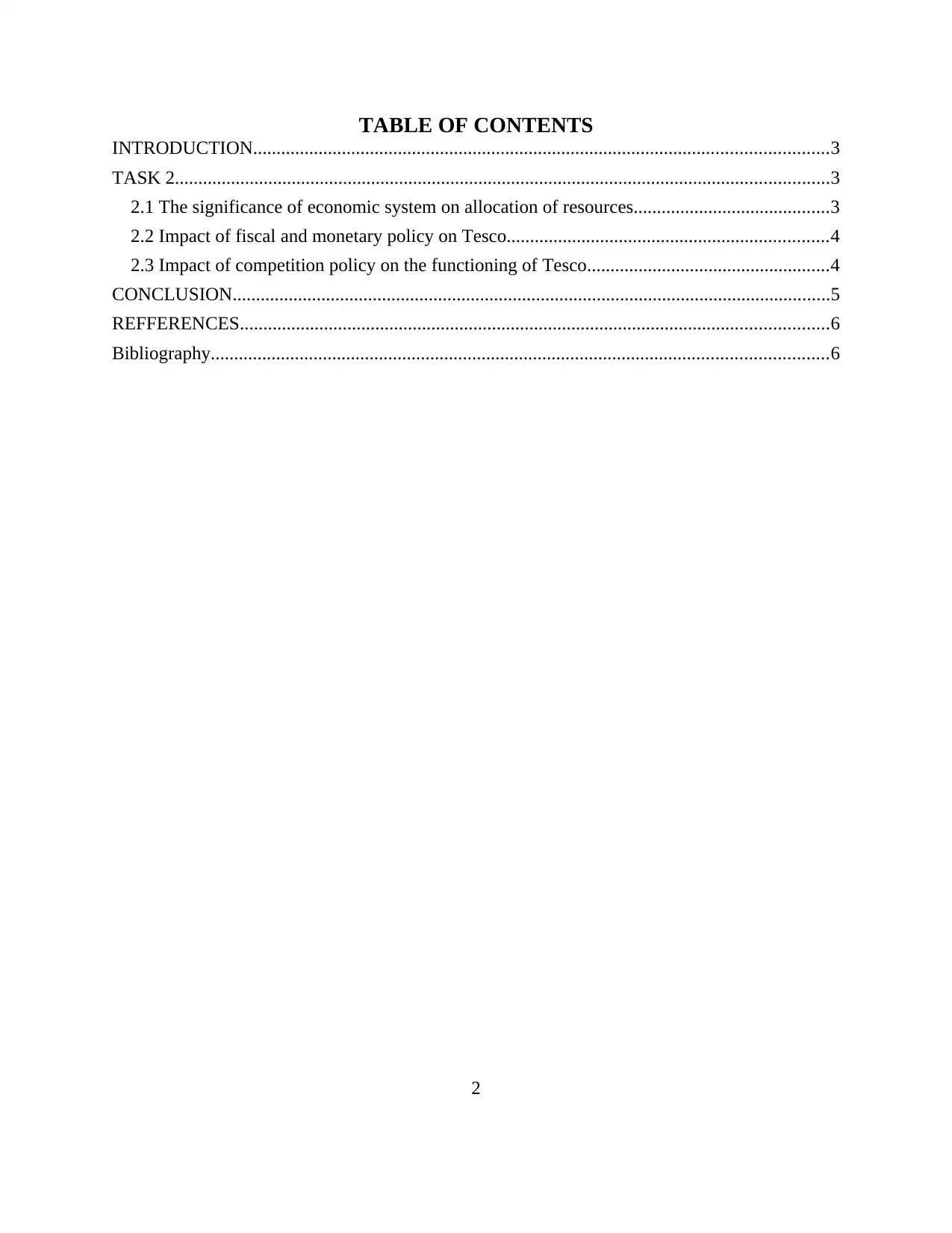
TABLE OF CONTENTS
INTRODUCTION...........................................................................................................................3
TASK 2............................................................................................................................................3
2.1 The significance of economic system on allocation of resources..........................................3
2.2 Impact of fiscal and monetary policy on Tesco.....................................................................4
2.3 Impact of competition policy on the functioning of Tesco....................................................4
CONCLUSION................................................................................................................................5
REFFERENCES..............................................................................................................................6
Bibliography....................................................................................................................................6
2
INTRODUCTION...........................................................................................................................3
TASK 2............................................................................................................................................3
2.1 The significance of economic system on allocation of resources..........................................3
2.2 Impact of fiscal and monetary policy on Tesco.....................................................................4
2.3 Impact of competition policy on the functioning of Tesco....................................................4
CONCLUSION................................................................................................................................5
REFFERENCES..............................................................................................................................6
Bibliography....................................................................................................................................6
2
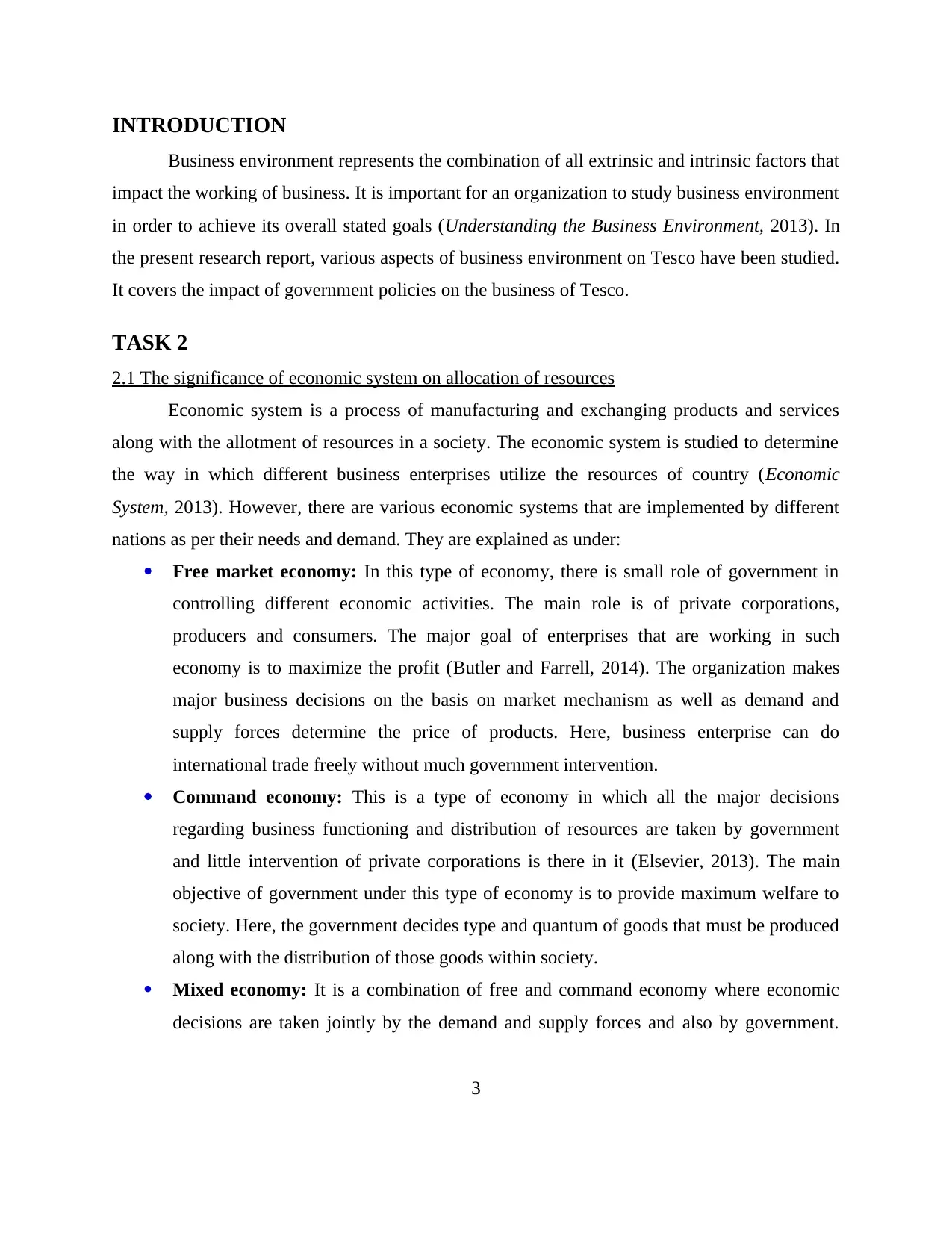
INTRODUCTION
Business environment represents the combination of all extrinsic and intrinsic factors that
impact the working of business. It is important for an organization to study business environment
in order to achieve its overall stated goals (Understanding the Business Environment, 2013). In
the present research report, various aspects of business environment on Tesco have been studied.
It covers the impact of government policies on the business of Tesco.
TASK 2
2.1 The significance of economic system on allocation of resources
Economic system is a process of manufacturing and exchanging products and services
along with the allotment of resources in a society. The economic system is studied to determine
the way in which different business enterprises utilize the resources of country (Economic
System, 2013). However, there are various economic systems that are implemented by different
nations as per their needs and demand. They are explained as under:
Free market economy: In this type of economy, there is small role of government in
controlling different economic activities. The main role is of private corporations,
producers and consumers. The major goal of enterprises that are working in such
economy is to maximize the profit (Butler and Farrell, 2014). The organization makes
major business decisions on the basis on market mechanism as well as demand and
supply forces determine the price of products. Here, business enterprise can do
international trade freely without much government intervention.
Command economy: This is a type of economy in which all the major decisions
regarding business functioning and distribution of resources are taken by government
and little intervention of private corporations is there in it (Elsevier, 2013). The main
objective of government under this type of economy is to provide maximum welfare to
society. Here, the government decides type and quantum of goods that must be produced
along with the distribution of those goods within society.
Mixed economy: It is a combination of free and command economy where economic
decisions are taken jointly by the demand and supply forces and also by government.
3
Business environment represents the combination of all extrinsic and intrinsic factors that
impact the working of business. It is important for an organization to study business environment
in order to achieve its overall stated goals (Understanding the Business Environment, 2013). In
the present research report, various aspects of business environment on Tesco have been studied.
It covers the impact of government policies on the business of Tesco.
TASK 2
2.1 The significance of economic system on allocation of resources
Economic system is a process of manufacturing and exchanging products and services
along with the allotment of resources in a society. The economic system is studied to determine
the way in which different business enterprises utilize the resources of country (Economic
System, 2013). However, there are various economic systems that are implemented by different
nations as per their needs and demand. They are explained as under:
Free market economy: In this type of economy, there is small role of government in
controlling different economic activities. The main role is of private corporations,
producers and consumers. The major goal of enterprises that are working in such
economy is to maximize the profit (Butler and Farrell, 2014). The organization makes
major business decisions on the basis on market mechanism as well as demand and
supply forces determine the price of products. Here, business enterprise can do
international trade freely without much government intervention.
Command economy: This is a type of economy in which all the major decisions
regarding business functioning and distribution of resources are taken by government
and little intervention of private corporations is there in it (Elsevier, 2013). The main
objective of government under this type of economy is to provide maximum welfare to
society. Here, the government decides type and quantum of goods that must be produced
along with the distribution of those goods within society.
Mixed economy: It is a combination of free and command economy where economic
decisions are taken jointly by the demand and supply forces and also by government.
3
⊘ This is a preview!⊘
Do you want full access?
Subscribe today to unlock all pages.

Trusted by 1+ million students worldwide
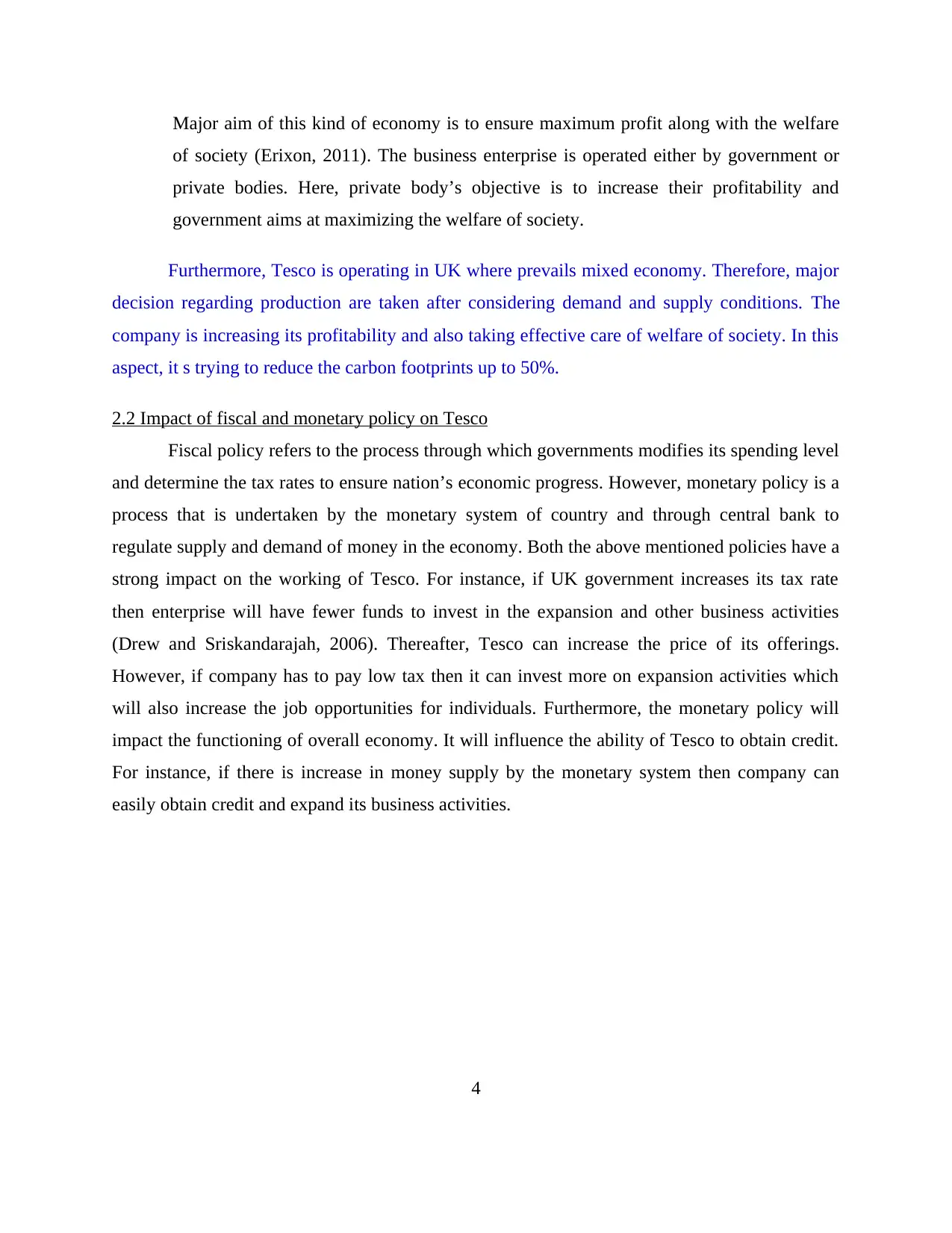
Major aim of this kind of economy is to ensure maximum profit along with the welfare
of society (Erixon, 2011). The business enterprise is operated either by government or
private bodies. Here, private body’s objective is to increase their profitability and
government aims at maximizing the welfare of society.
Furthermore, Tesco is operating in UK where prevails mixed economy. Therefore, major
decision regarding production are taken after considering demand and supply conditions. The
company is increasing its profitability and also taking effective care of welfare of society. In this
aspect, it s trying to reduce the carbon footprints up to 50%.
2.2 Impact of fiscal and monetary policy on Tesco
Fiscal policy refers to the process through which governments modifies its spending level
and determine the tax rates to ensure nation’s economic progress. However, monetary policy is a
process that is undertaken by the monetary system of country and through central bank to
regulate supply and demand of money in the economy. Both the above mentioned policies have a
strong impact on the working of Tesco. For instance, if UK government increases its tax rate
then enterprise will have fewer funds to invest in the expansion and other business activities
(Drew and Sriskandarajah, 2006). Thereafter, Tesco can increase the price of its offerings.
However, if company has to pay low tax then it can invest more on expansion activities which
will also increase the job opportunities for individuals. Furthermore, the monetary policy will
impact the functioning of overall economy. It will influence the ability of Tesco to obtain credit.
For instance, if there is increase in money supply by the monetary system then company can
easily obtain credit and expand its business activities.
4
of society (Erixon, 2011). The business enterprise is operated either by government or
private bodies. Here, private body’s objective is to increase their profitability and
government aims at maximizing the welfare of society.
Furthermore, Tesco is operating in UK where prevails mixed economy. Therefore, major
decision regarding production are taken after considering demand and supply conditions. The
company is increasing its profitability and also taking effective care of welfare of society. In this
aspect, it s trying to reduce the carbon footprints up to 50%.
2.2 Impact of fiscal and monetary policy on Tesco
Fiscal policy refers to the process through which governments modifies its spending level
and determine the tax rates to ensure nation’s economic progress. However, monetary policy is a
process that is undertaken by the monetary system of country and through central bank to
regulate supply and demand of money in the economy. Both the above mentioned policies have a
strong impact on the working of Tesco. For instance, if UK government increases its tax rate
then enterprise will have fewer funds to invest in the expansion and other business activities
(Drew and Sriskandarajah, 2006). Thereafter, Tesco can increase the price of its offerings.
However, if company has to pay low tax then it can invest more on expansion activities which
will also increase the job opportunities for individuals. Furthermore, the monetary policy will
impact the functioning of overall economy. It will influence the ability of Tesco to obtain credit.
For instance, if there is increase in money supply by the monetary system then company can
easily obtain credit and expand its business activities.
4
Paraphrase This Document
Need a fresh take? Get an instant paraphrase of this document with our AI Paraphraser
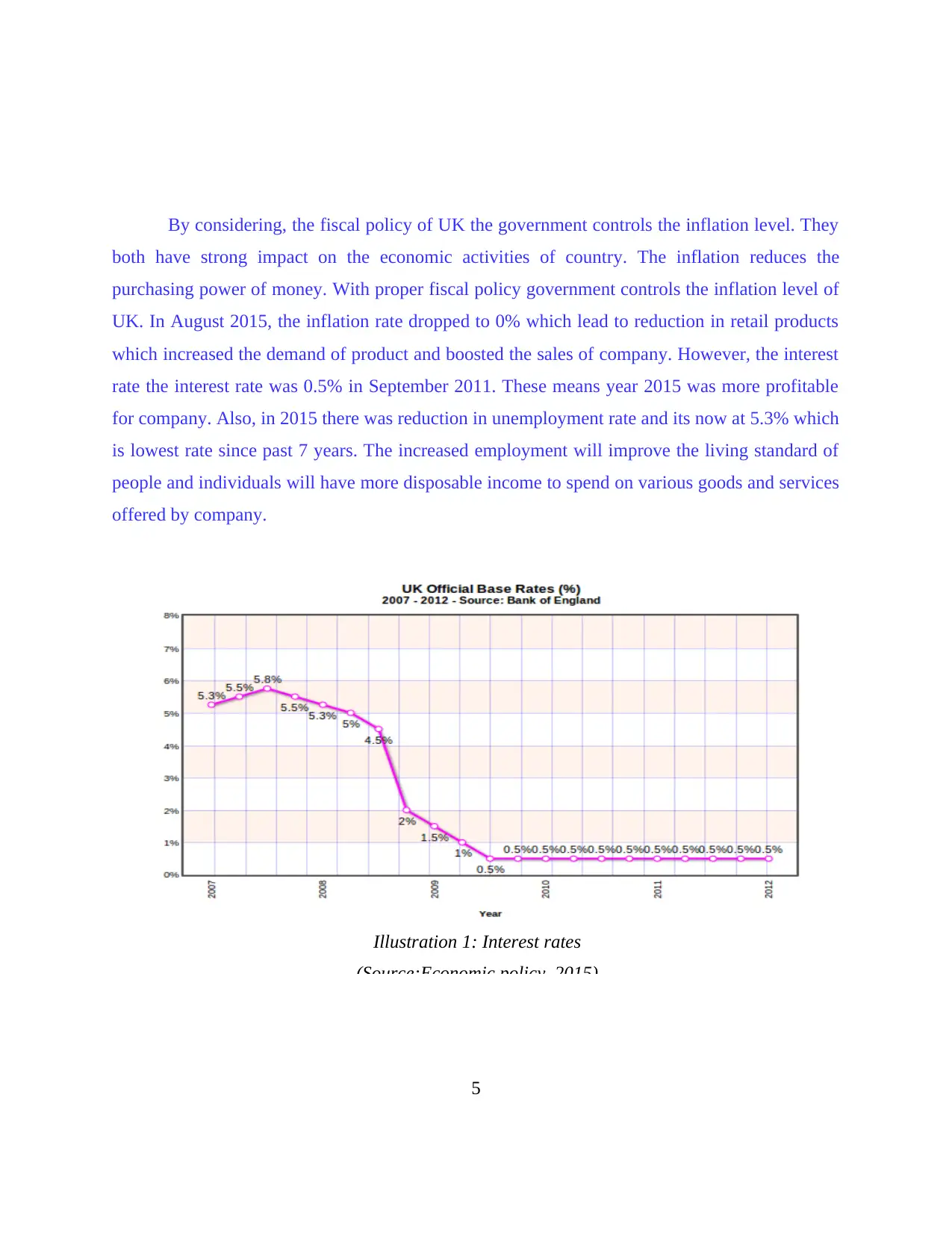
By considering, the fiscal policy of UK the government controls the inflation level. They
both have strong impact on the economic activities of country. The inflation reduces the
purchasing power of money. With proper fiscal policy government controls the inflation level of
UK. In August 2015, the inflation rate dropped to 0% which lead to reduction in retail products
which increased the demand of product and boosted the sales of company. However, the interest
rate the interest rate was 0.5% in September 2011. These means year 2015 was more profitable
for company. Also, in 2015 there was reduction in unemployment rate and its now at 5.3% which
is lowest rate since past 7 years. The increased employment will improve the living standard of
people and individuals will have more disposable income to spend on various goods and services
offered by company.
5
Illustration 1: Interest rates
(Source:Economic policy, 2015)
both have strong impact on the economic activities of country. The inflation reduces the
purchasing power of money. With proper fiscal policy government controls the inflation level of
UK. In August 2015, the inflation rate dropped to 0% which lead to reduction in retail products
which increased the demand of product and boosted the sales of company. However, the interest
rate the interest rate was 0.5% in September 2011. These means year 2015 was more profitable
for company. Also, in 2015 there was reduction in unemployment rate and its now at 5.3% which
is lowest rate since past 7 years. The increased employment will improve the living standard of
people and individuals will have more disposable income to spend on various goods and services
offered by company.
5
Illustration 1: Interest rates
(Source:Economic policy, 2015)
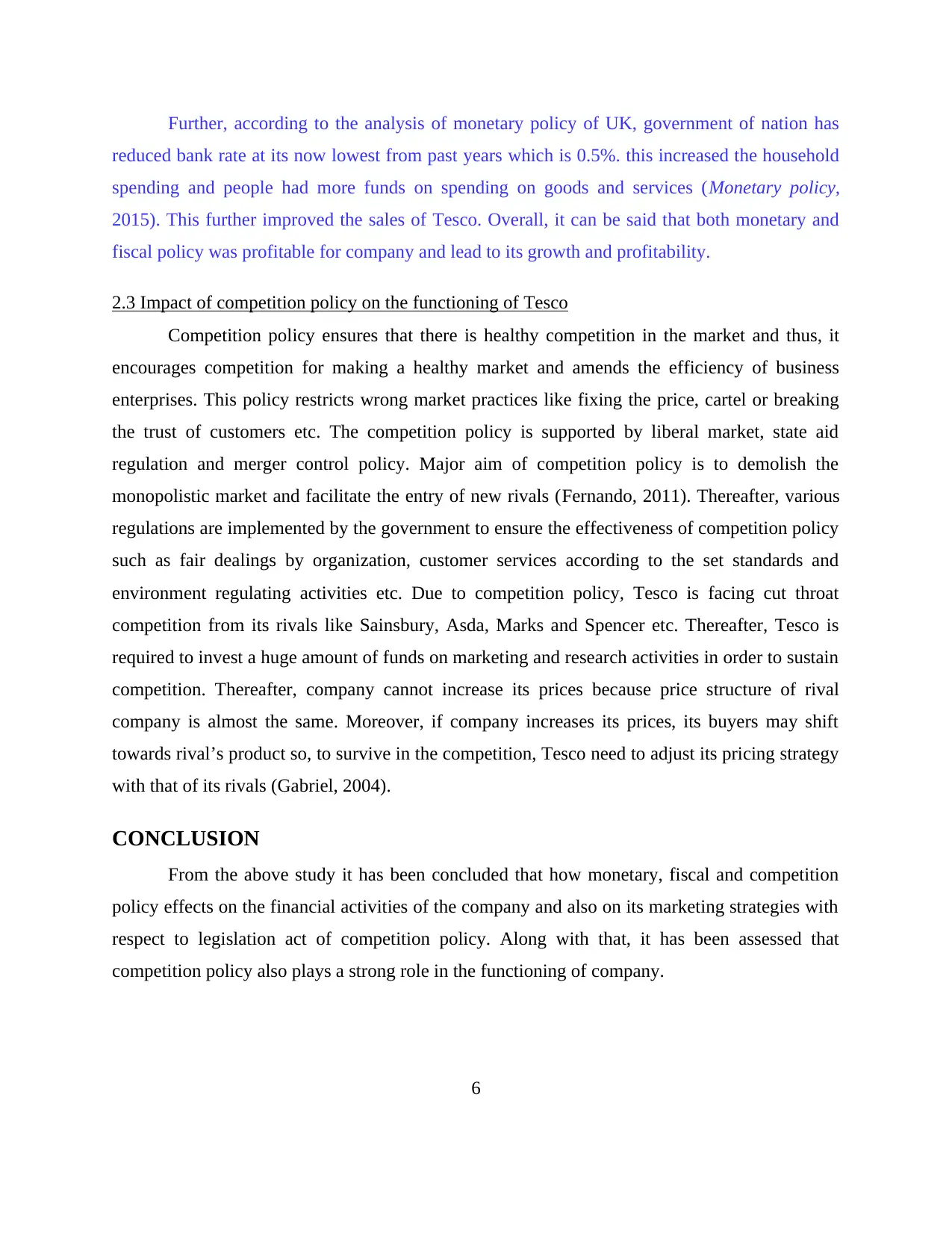
Further, according to the analysis of monetary policy of UK, government of nation has
reduced bank rate at its now lowest from past years which is 0.5%. this increased the household
spending and people had more funds on spending on goods and services (Monetary policy,
2015). This further improved the sales of Tesco. Overall, it can be said that both monetary and
fiscal policy was profitable for company and lead to its growth and profitability.
2.3 Impact of competition policy on the functioning of Tesco
Competition policy ensures that there is healthy competition in the market and thus, it
encourages competition for making a healthy market and amends the efficiency of business
enterprises. This policy restricts wrong market practices like fixing the price, cartel or breaking
the trust of customers etc. The competition policy is supported by liberal market, state aid
regulation and merger control policy. Major aim of competition policy is to demolish the
monopolistic market and facilitate the entry of new rivals (Fernando, 2011). Thereafter, various
regulations are implemented by the government to ensure the effectiveness of competition policy
such as fair dealings by organization, customer services according to the set standards and
environment regulating activities etc. Due to competition policy, Tesco is facing cut throat
competition from its rivals like Sainsbury, Asda, Marks and Spencer etc. Thereafter, Tesco is
required to invest a huge amount of funds on marketing and research activities in order to sustain
competition. Thereafter, company cannot increase its prices because price structure of rival
company is almost the same. Moreover, if company increases its prices, its buyers may shift
towards rival’s product so, to survive in the competition, Tesco need to adjust its pricing strategy
with that of its rivals (Gabriel, 2004).
CONCLUSION
From the above study it has been concluded that how monetary, fiscal and competition
policy effects on the financial activities of the company and also on its marketing strategies with
respect to legislation act of competition policy. Along with that, it has been assessed that
competition policy also plays a strong role in the functioning of company.
6
reduced bank rate at its now lowest from past years which is 0.5%. this increased the household
spending and people had more funds on spending on goods and services (Monetary policy,
2015). This further improved the sales of Tesco. Overall, it can be said that both monetary and
fiscal policy was profitable for company and lead to its growth and profitability.
2.3 Impact of competition policy on the functioning of Tesco
Competition policy ensures that there is healthy competition in the market and thus, it
encourages competition for making a healthy market and amends the efficiency of business
enterprises. This policy restricts wrong market practices like fixing the price, cartel or breaking
the trust of customers etc. The competition policy is supported by liberal market, state aid
regulation and merger control policy. Major aim of competition policy is to demolish the
monopolistic market and facilitate the entry of new rivals (Fernando, 2011). Thereafter, various
regulations are implemented by the government to ensure the effectiveness of competition policy
such as fair dealings by organization, customer services according to the set standards and
environment regulating activities etc. Due to competition policy, Tesco is facing cut throat
competition from its rivals like Sainsbury, Asda, Marks and Spencer etc. Thereafter, Tesco is
required to invest a huge amount of funds on marketing and research activities in order to sustain
competition. Thereafter, company cannot increase its prices because price structure of rival
company is almost the same. Moreover, if company increases its prices, its buyers may shift
towards rival’s product so, to survive in the competition, Tesco need to adjust its pricing strategy
with that of its rivals (Gabriel, 2004).
CONCLUSION
From the above study it has been concluded that how monetary, fiscal and competition
policy effects on the financial activities of the company and also on its marketing strategies with
respect to legislation act of competition policy. Along with that, it has been assessed that
competition policy also plays a strong role in the functioning of company.
6
⊘ This is a preview!⊘
Do you want full access?
Subscribe today to unlock all pages.

Trusted by 1+ million students worldwide
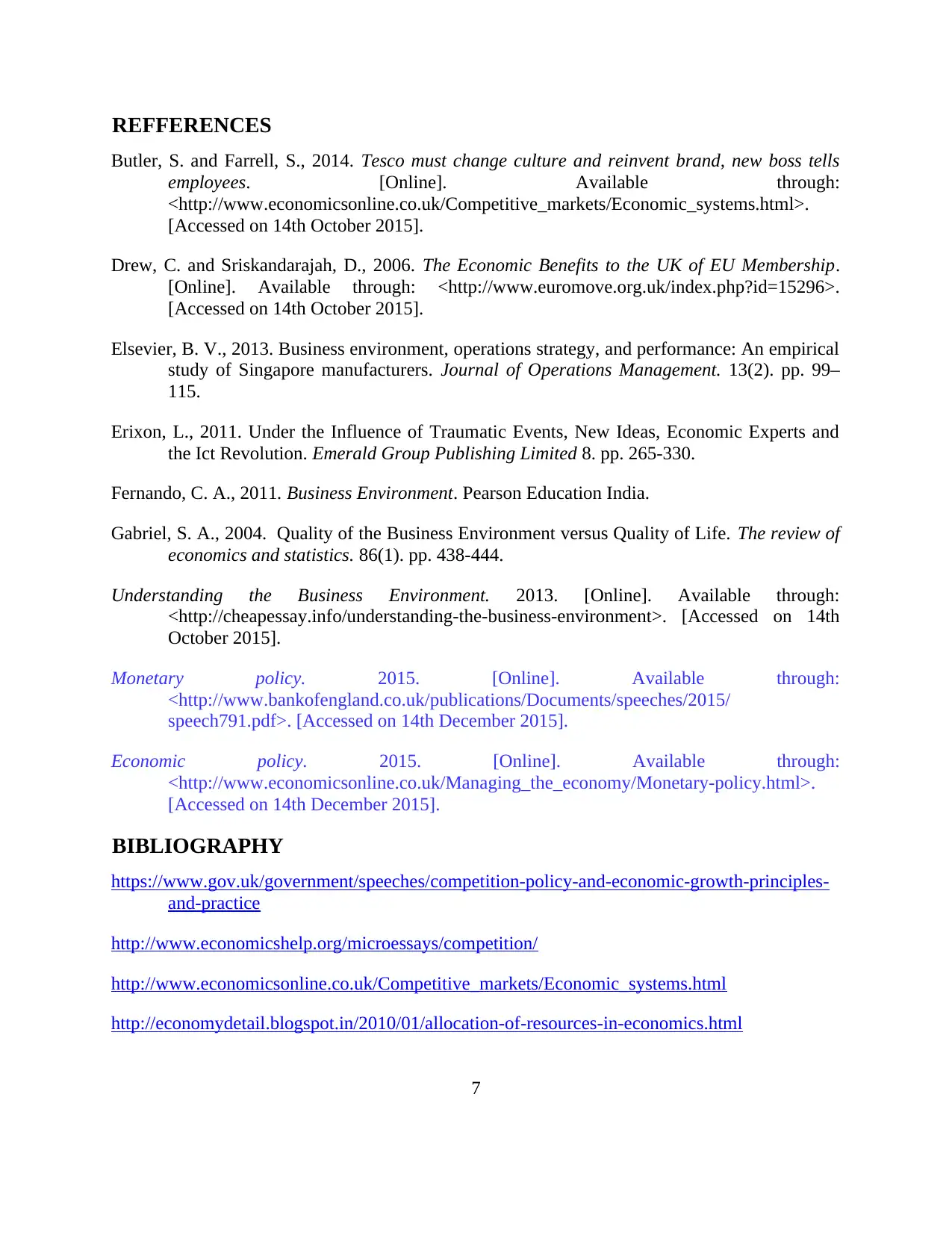
REFFERENCES
Butler, S. and Farrell, S., 2014. Tesco must change culture and reinvent brand, new boss tells
employees. [Online]. Available through:
<http://www.economicsonline.co.uk/Competitive_markets/Economic_systems.html>.
[Accessed on 14th October 2015].
Drew, C. and Sriskandarajah, D., 2006. The Economic Benefits to the UK of EU Membership.
[Online]. Available through: <http://www.euromove.org.uk/index.php?id=15296>.
[Accessed on 14th October 2015].
Elsevier, B. V., 2013. Business environment, operations strategy, and performance: An empirical
study of Singapore manufacturers. Journal of Operations Management. 13(2). pp. 99–
115.
Erixon, L., 2011. Under the Influence of Traumatic Events, New Ideas, Economic Experts and
the Ict Revolution. Emerald Group Publishing Limited 8. pp. 265-330.
Fernando, C. A., 2011. Business Environment. Pearson Education India.
Gabriel, S. A., 2004. Quality of the Business Environment versus Quality of Life. The review of
economics and statistics. 86(1). pp. 438-444.
Understanding the Business Environment. 2013. [Online]. Available through:
<http://cheapessay.info/understanding-the-business-environment>. [Accessed on 14th
October 2015].
Monetary policy. 2015. [Online]. Available through:
<http://www.bankofengland.co.uk/publications/Documents/speeches/2015/
speech791.pdf>. [Accessed on 14th December 2015].
Economic policy. 2015. [Online]. Available through:
<http://www.economicsonline.co.uk/Managing_the_economy/Monetary-policy.html>.
[Accessed on 14th December 2015].
BIBLIOGRAPHY
https://www.gov.uk/government/speeches/competition-policy-and-economic-growth-principles-
and-practice
http://www.economicshelp.org/microessays/competition/
http://www.economicsonline.co.uk/Competitive_markets/Economic_systems.html
http://economydetail.blogspot.in/2010/01/allocation-of-resources-in-economics.html
7
Butler, S. and Farrell, S., 2014. Tesco must change culture and reinvent brand, new boss tells
employees. [Online]. Available through:
<http://www.economicsonline.co.uk/Competitive_markets/Economic_systems.html>.
[Accessed on 14th October 2015].
Drew, C. and Sriskandarajah, D., 2006. The Economic Benefits to the UK of EU Membership.
[Online]. Available through: <http://www.euromove.org.uk/index.php?id=15296>.
[Accessed on 14th October 2015].
Elsevier, B. V., 2013. Business environment, operations strategy, and performance: An empirical
study of Singapore manufacturers. Journal of Operations Management. 13(2). pp. 99–
115.
Erixon, L., 2011. Under the Influence of Traumatic Events, New Ideas, Economic Experts and
the Ict Revolution. Emerald Group Publishing Limited 8. pp. 265-330.
Fernando, C. A., 2011. Business Environment. Pearson Education India.
Gabriel, S. A., 2004. Quality of the Business Environment versus Quality of Life. The review of
economics and statistics. 86(1). pp. 438-444.
Understanding the Business Environment. 2013. [Online]. Available through:
<http://cheapessay.info/understanding-the-business-environment>. [Accessed on 14th
October 2015].
Monetary policy. 2015. [Online]. Available through:
<http://www.bankofengland.co.uk/publications/Documents/speeches/2015/
speech791.pdf>. [Accessed on 14th December 2015].
Economic policy. 2015. [Online]. Available through:
<http://www.economicsonline.co.uk/Managing_the_economy/Monetary-policy.html>.
[Accessed on 14th December 2015].
BIBLIOGRAPHY
https://www.gov.uk/government/speeches/competition-policy-and-economic-growth-principles-
and-practice
http://www.economicshelp.org/microessays/competition/
http://www.economicsonline.co.uk/Competitive_markets/Economic_systems.html
http://economydetail.blogspot.in/2010/01/allocation-of-resources-in-economics.html
7
1 out of 7
Related Documents
Your All-in-One AI-Powered Toolkit for Academic Success.
+13062052269
info@desklib.com
Available 24*7 on WhatsApp / Email
![[object Object]](/_next/static/media/star-bottom.7253800d.svg)
Unlock your academic potential
Copyright © 2020–2026 A2Z Services. All Rights Reserved. Developed and managed by ZUCOL.





